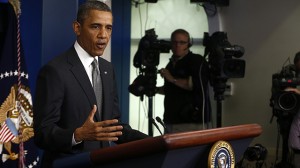
President Barack Obama will give a speech on possible changes to the NSA on Friday. (AP Photo/Charles Dharapak)
Ahead of President Obama’s speech on Friday on reforms to the government’s spying programs, we asked surveillance expert Heidi Boghosian to share her thoughts on how he might restore confidence in the National Security Agency (NSA). Boghosian recently spoke with Bill Moyers about what Americans need to know about spying and civil liberties.
President Barack Obama’s legacy may well rest on how he responds to public concerns about government surveillance and recommendations from a presidential review panel.
A new poll out today indicates that a majority of Americans strongly favor reigning in surveillance programs. The poll, by Anzalone Liszt Grove Research, found that 59 percent of Americans oppose leaving the NSA programs in place “without any changes.”
The polling reflects some of the concerns raised by a five-member panel appointed by President Obama in their report “Liberty and Security in a Changing World,” released last month. With 46 recommendations, the panel essentially handed Obama a blueprint for reforming the administration’s overreaching surveillance program.
The panel said that the government should stop collecting and storing vast amounts of data and proposed that it be held instead by a third party, such as telephone companies, with the spying agency only able to access records in controlled circumstances. They agreed with the Foreign Intelligence Surveillance Court (FISC) Judge Reggie Walton who concluded that the current practice posed too great a risk to individual freedom and quality of life because the government’s own rules regarding metadata were “frequently and systematically violated.” Knowing that a government has direct access to personal records can chill associative and expressive freedoms.
Related: Judge Rules Against the NSA’s Surveillance Program
The panel also called for restrictions on the ability of the secretive FISC to compel third parties, such as telephone service providers, to reveal customers’ private information. Other recommendations included the establishment of a Civil Liberties and Privacy Protection Board; a way for whistleblowers to report directly to the Protection Board; closing loopholes allowing “backdoor” access to customers’ data through US-based technology companies and strengthening requirements for security clearances.
If the president enacts the oversight measures, he may secure a place in history as a leader who restored public confidence in government and helped to stem the chilling effect of spying on free speech. If he chooses not to adopt the suggestions, notably those related to metadata storage and FISC accountability, he may irreparably erode public trust and continue to thin the lifeblood of our democracy.
AT&T/Verizon Opposed
Some telecommunication firms, such as AT&T and Verizon, have expressed opposition to the panel’s recommendation that private entities hold on to telephone data. But just as government agencies worked closely with big business in conducting mass surveillance and data collection while the latter reaps enormous financial profits, so now President Obama should urge communications industry leaders to support reforms that will help bring back a working democracy.
Just days after the report was released, however, the government brazenly pushed to sustain its surveillance program. After Judge Richard Leon ruled on December 16, 2013, that the NSA program was unconstitutional — calling it an indiscriminate and arbitrary invasion of Americans’ privacy — the Department of Justice filed a notice of appeal. And in early January 2014, the FISC reauthorized the NSA’s telephone records gathering program for 90 more days.
Obama need not look too far back in history for a lesson in legacy. Richard Nixon is remembered as the president who abused executive power, lied to the American people about illegal wiretapping and the Watergate burglary, and resigned in disgrace.
Americans’ confidence in government plummeted in 1971 with disclosures that the CIA and FBI were conducting illicit intelligence operations against citizens. A Senate committee investigated the activities, which led to regulations that limited domestic spying. The head of that committee, Senator Frank Church, warned that the NSA’s “capability at any time could be turned around on the American people, and no American would have any privacy left, such is the capability to monitor everything: telephone conversations, telegrams, it doesn’t matter. There would be no place to hide.”
Related: Decades Before Snowden, Burglars Exposed Illegal Spying
This is the reality we face today. A power-driven government and corporations have profited from a perpetual war on terror in which personal data is collected and sold in blatant contempt of the Fourth Amendment. Compounding this, limits on domestic spying have eroded over the past four decades, all but evaporating after 9/11.
The authors of “Liberty and Security in a Changing World” noted in their report to the president that their goal was to “promote enduring values in a period of rapid change, and to assert that those values are essentially timeless.” Our leaders have an opening — and a responsibility — to do just that.


